-
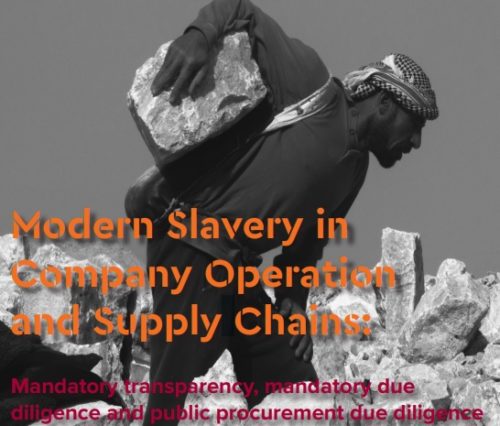 This paper sets out what leading governments are already doing to insist global business does more to eradicate modern slavery. It draws from this experience to set out how these uncoordinated actions could become a robust, and harmonised international standard for national legislation.
This paper sets out what leading governments are already doing to insist global business does more to eradicate modern slavery. It draws from this experience to set out how these uncoordinated actions could become a robust, and harmonised international standard for national legislation.Credit: ITUC and Business and Human Rights Resource Centre
-
 Hedging Risk by Combating Human Trafficking: Insights from the Private Sector is designed to help companies share best practices so they can mitigate their risks and help eliminate this heinous practice. In this first of a series, we highlight insights and technology-driven interventions in the hospitality, finance, and transportation industries.
Hedging Risk by Combating Human Trafficking: Insights from the Private Sector is designed to help companies share best practices so they can mitigate their risks and help eliminate this heinous practice. In this first of a series, we highlight insights and technology-driven interventions in the hospitality, finance, and transportation industries.Credit: World Economic Forum
-
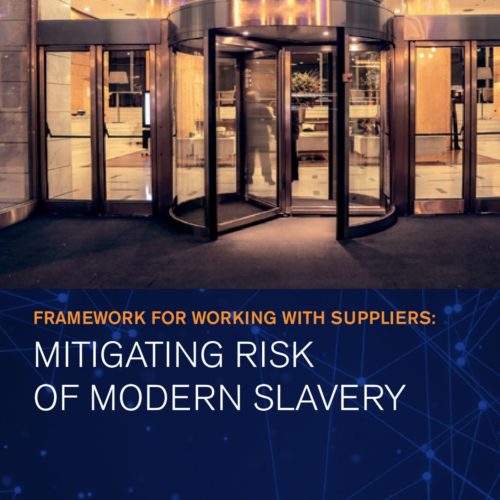 The Framework for Working with Suppliers: Mitigating Risk of Modern Slavery is a tool intended to be used by stakeholders at various levels of management within the hotel industry. It recommends specific responsibilities for brands, hotel owners and management companies, based on best practice and the experience and input of the Stop Slavery Hotel Industry Network (the "Network") membership. The Network brings together representatives from across the hotel industry to combat human trafficking and modern slavery within the sector. Its ethos stems from the acknowledgement that actors across the industry, whether international brands, bespoke hotel groups, independent owners, managers or employee agencies are all responsible for combating this horrific crime.
The Framework for Working with Suppliers: Mitigating Risk of Modern Slavery is a tool intended to be used by stakeholders at various levels of management within the hotel industry. It recommends specific responsibilities for brands, hotel owners and management companies, based on best practice and the experience and input of the Stop Slavery Hotel Industry Network (the "Network") membership. The Network brings together representatives from across the hotel industry to combat human trafficking and modern slavery within the sector. Its ethos stems from the acknowledgement that actors across the industry, whether international brands, bespoke hotel groups, independent owners, managers or employee agencies are all responsible for combating this horrific crime.Credit: Stop Slavery Hotel Industry Network
-
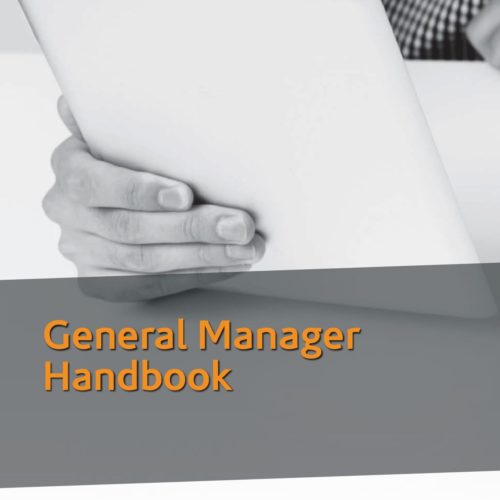 This Handbook is to be used by General Managers in conjunction with the Stop Slavery Blueprint. It offers practical tools to help operationalise the guidance from the Blueprint and provides example documents that can be adapted and used accordingly. The Stop Slavery Blueprint has been created by Shiva Foundation and was initially trialled in a group of hotels, with its implementation coordinated and supported by the Foundation. The Blueprint sets out the key principles for hoteliers wishing to implement their own anti-slavery initiatives.
This Handbook is to be used by General Managers in conjunction with the Stop Slavery Blueprint. It offers practical tools to help operationalise the guidance from the Blueprint and provides example documents that can be adapted and used accordingly. The Stop Slavery Blueprint has been created by Shiva Foundation and was initially trialled in a group of hotels, with its implementation coordinated and supported by the Foundation. The Blueprint sets out the key principles for hoteliers wishing to implement their own anti-slavery initiatives.Credit: Shiva Foundation
-
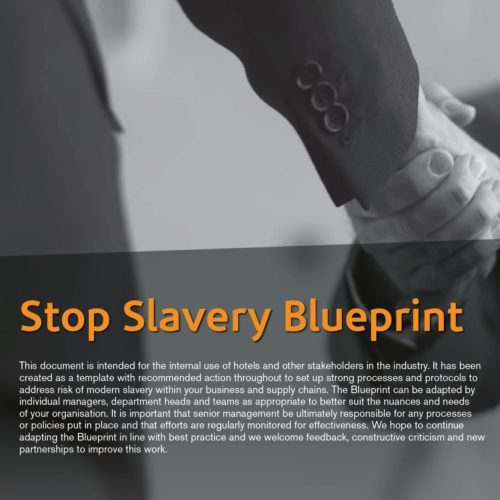 The Stop Slavery Blueprint has been created by Shiva Foundation and was initially trialled in a group of hotels, with its implementation coordinated and supported by the Foundation. The Blueprint sets out the key principles for hoteliers wishing to implement their own anti-slavery initiatives. It provides guidance and recommendations in the form of: • Policies and practices, • Procedures and protocols, and • A checklist of suggested actions. The Blueprint also sets out guidance on transparency, reporting, performance measurement, business partner engagement, risk assessment, business authentication, and investigation and remediation. It is meant to be used in conjunction with the Stop Slavery General Manager Handbook which provides practical guidance and materials.
The Stop Slavery Blueprint has been created by Shiva Foundation and was initially trialled in a group of hotels, with its implementation coordinated and supported by the Foundation. The Blueprint sets out the key principles for hoteliers wishing to implement their own anti-slavery initiatives. It provides guidance and recommendations in the form of: • Policies and practices, • Procedures and protocols, and • A checklist of suggested actions. The Blueprint also sets out guidance on transparency, reporting, performance measurement, business partner engagement, risk assessment, business authentication, and investigation and remediation. It is meant to be used in conjunction with the Stop Slavery General Manager Handbook which provides practical guidance and materials.Credit: Shiva Foundation
-
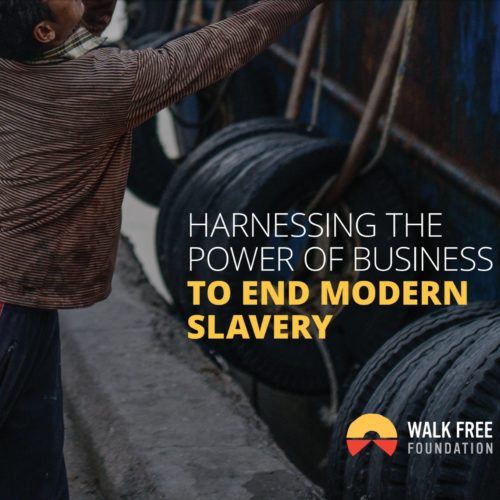 The Walk Free Foundation was established by Andrew Forrest, the Chairman of Fortescue Metals Group, after he found labour exploitation within his own supply chains and took a number of steps to prevent modern slavery affecting his business. This report provides an overview of modern slavery in a global context with statistics, case studies, and review of legislation and policy.
The Walk Free Foundation was established by Andrew Forrest, the Chairman of Fortescue Metals Group, after he found labour exploitation within his own supply chains and took a number of steps to prevent modern slavery affecting his business. This report provides an overview of modern slavery in a global context with statistics, case studies, and review of legislation and policy.Credit: Walk Free Foundation
-
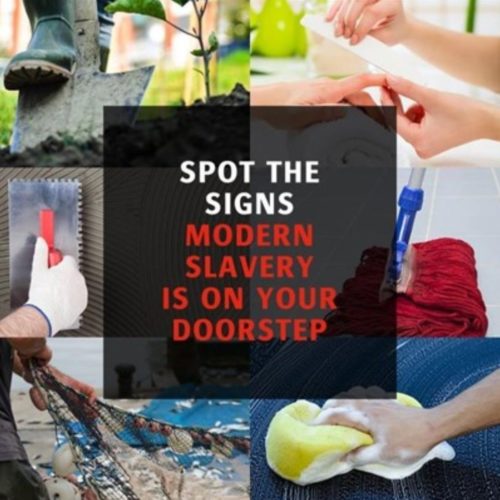 Crimestoppers is an independent charity helping law enforcement to locate criminals and help solve crimes. They have an anonymous 24/7 phone number (0800 555 111) that people can call to pass on information about crime. They are running a campaign to help people identify the signs of modern slavery and give specific information about the hospitality sector. The flyer about spotting the signs is in six languages.
Crimestoppers is an independent charity helping law enforcement to locate criminals and help solve crimes. They have an anonymous 24/7 phone number (0800 555 111) that people can call to pass on information about crime. They are running a campaign to help people identify the signs of modern slavery and give specific information about the hospitality sector. The flyer about spotting the signs is in six languages.Credit: Crimestoppers
-
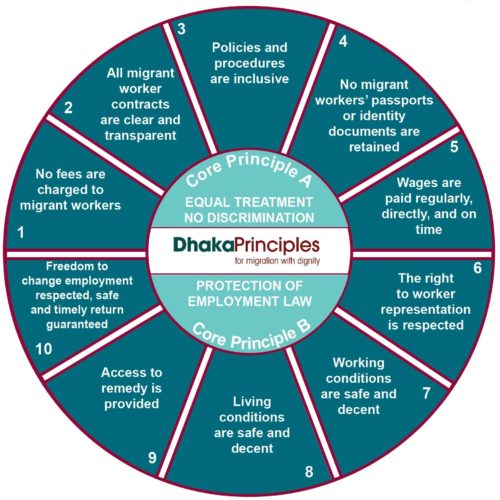 The Dhaka Principles provide a roadmap that traces a migrant worker from recruitment, through employment, to the end of contract. They provide key principles that employers and migrant recruiters should respect at each stage in the process to ensure migration with dignity.
The Dhaka Principles provide a roadmap that traces a migrant worker from recruitment, through employment, to the end of contract. They provide key principles that employers and migrant recruiters should respect at each stage in the process to ensure migration with dignity.Credit: Institute for Human Rights and Business
-
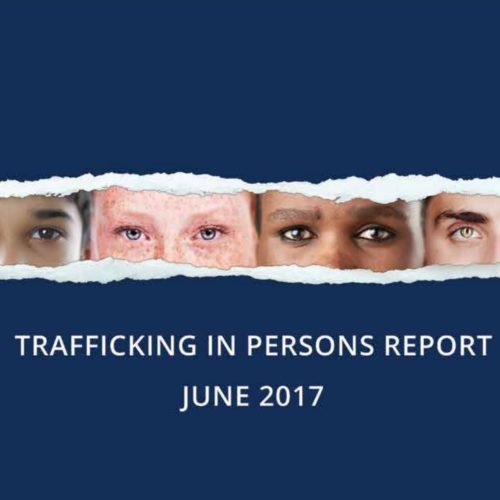 The Trafficking in Persons Report, or TIP Report, is an annual report issued by the U.S. State Department's Office to Monitor and Combat Trafficking in Persons. It provides countrywide statistics on Human Trafficking including definitions, themes and case studies. It ranks governments based on their perceived efforts to acknowledge and combat human trafficking.
The Trafficking in Persons Report, or TIP Report, is an annual report issued by the U.S. State Department's Office to Monitor and Combat Trafficking in Persons. It provides countrywide statistics on Human Trafficking including definitions, themes and case studies. It ranks governments based on their perceived efforts to acknowledge and combat human trafficking.Credit: United States of America Department of State
-
 Polaris is a US-based anti-slavery NGO. They gather stories of survivors of human trafficking in different settings. The Typology of Modern Slavery they have created breaks down human trafficking into categories based on industry, providing solutions for tackling the crime based on the characteristics of each.
Polaris is a US-based anti-slavery NGO. They gather stories of survivors of human trafficking in different settings. The Typology of Modern Slavery they have created breaks down human trafficking into categories based on industry, providing solutions for tackling the crime based on the characteristics of each.Credit: Polaris Project
-
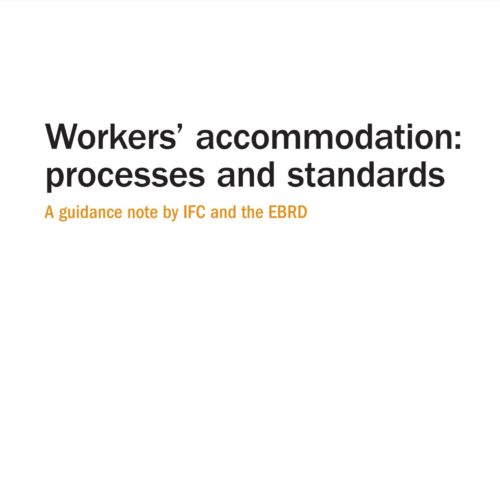 This Guidance Note is written by the EBRD, an international financial institution, and the IFC, a member of the World Bank Group, which creates opportunity for people to escape poverty and improve their lives. It is aimed at providing practical guidance to IFC and EBRD specialists, consultants and clients on the processes and standards that should be applied to the provision of workers’ accommodation in relation to projects funded by IFC or the EBRD. The Guidance Note also provides examples of good practice approaches that businesses have successfully applied in their operations.
This Guidance Note is written by the EBRD, an international financial institution, and the IFC, a member of the World Bank Group, which creates opportunity for people to escape poverty and improve their lives. It is aimed at providing practical guidance to IFC and EBRD specialists, consultants and clients on the processes and standards that should be applied to the provision of workers’ accommodation in relation to projects funded by IFC or the EBRD. The Guidance Note also provides examples of good practice approaches that businesses have successfully applied in their operations.Credit: International Finance Corporation & the European Bank for Reconstruction and Development
-
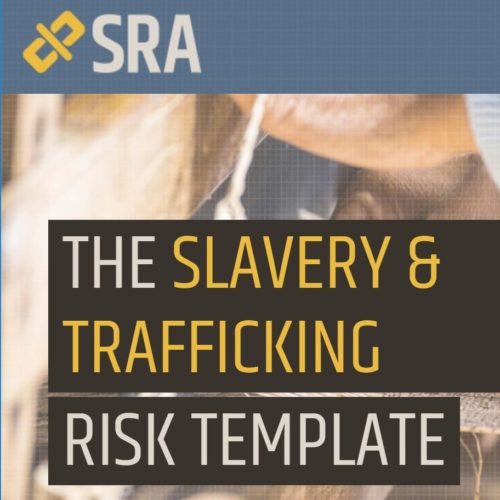 The Slavery and Human Trafficking Risk Template (STRT) is a free, open-source data collection template that forms the backbone of corporate modern slavery due diligence programs. It is maintained by a Development Committee committed to ensuring it keeps stride with new research and evolving industry needs. It is housed under the Social Responsibility Alliance, an initiative dedicated to providing companies with the open-source data collection tools they need to build socially responsible supply chains.
The Slavery and Human Trafficking Risk Template (STRT) is a free, open-source data collection template that forms the backbone of corporate modern slavery due diligence programs. It is maintained by a Development Committee committed to ensuring it keeps stride with new research and evolving industry needs. It is housed under the Social Responsibility Alliance, an initiative dedicated to providing companies with the open-source data collection tools they need to build socially responsible supply chains.Credit: Social Responsibility Alliance
-
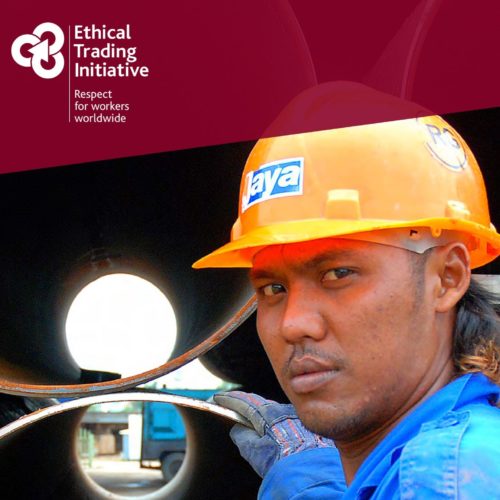 The Ethical Trading Initiative (ETI) is an alliance of companies, trade unions and NGOs that promotes workers' rights around the world. This guide is for companies to help them prevent and manage labour rights risks, and understand why engagement, negotiation and collaboration is key.
The Ethical Trading Initiative (ETI) is an alliance of companies, trade unions and NGOs that promotes workers' rights around the world. This guide is for companies to help them prevent and manage labour rights risks, and understand why engagement, negotiation and collaboration is key.Credit: Ethical Trading Initiative
-
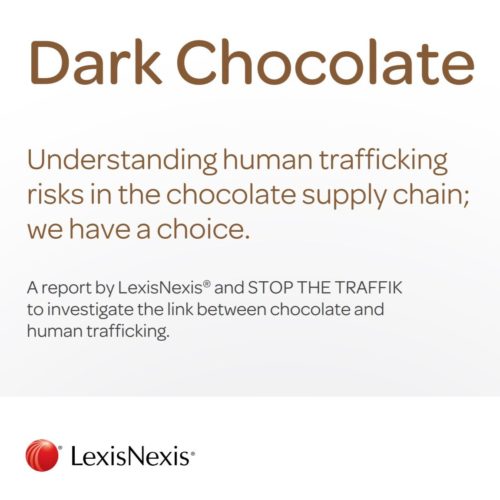 LexisNexis and STOP THE TRAFFIK produced this report after an investigation into the link between chocolate and human trafficking. The report is aimed at consumers seeking to better understand the products they consume, those working with suppliers and NGOs seeking to understand how media cover societal issues.
LexisNexis and STOP THE TRAFFIK produced this report after an investigation into the link between chocolate and human trafficking. The report is aimed at consumers seeking to better understand the products they consume, those working with suppliers and NGOs seeking to understand how media cover societal issues.Credit: Lexis Nexis and Stop the Traffik
-
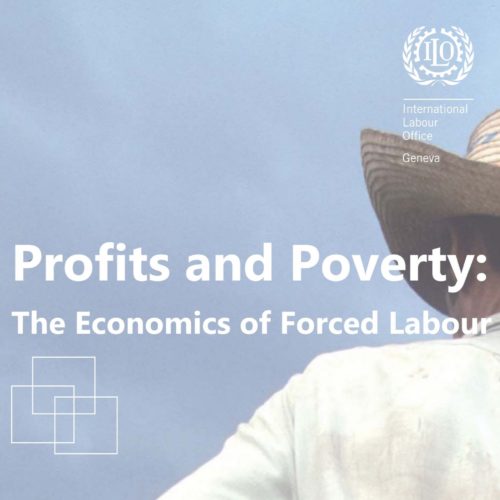 The purpose of this ILO report is to give a better understanding of the socio-economic root causes as well as a new assessment of the profits of forced labour. It highlights how forced labour thrives in the incubator of poverty and vulnerability, low levels of education and literacy, migration and other factors. The evidence and results presented in this report illustrate the need for stronger measures of prevention and protection and for enhanced law enforcement as the basic responses to forced labour. At the same time, it also provides new knowledge of the determinants of forced labour that can help with developing and expanding policies and programmes to not only stop forced labour where it exists, but prevent it before it occurs.
The purpose of this ILO report is to give a better understanding of the socio-economic root causes as well as a new assessment of the profits of forced labour. It highlights how forced labour thrives in the incubator of poverty and vulnerability, low levels of education and literacy, migration and other factors. The evidence and results presented in this report illustrate the need for stronger measures of prevention and protection and for enhanced law enforcement as the basic responses to forced labour. At the same time, it also provides new knowledge of the determinants of forced labour that can help with developing and expanding policies and programmes to not only stop forced labour where it exists, but prevent it before it occurs.Credit: International Labour Office (ILO) Special Action Programme to Combat Forced Labour (SAP-FL) Fundamental Principles and Rights at Work Branch (FPRW)


